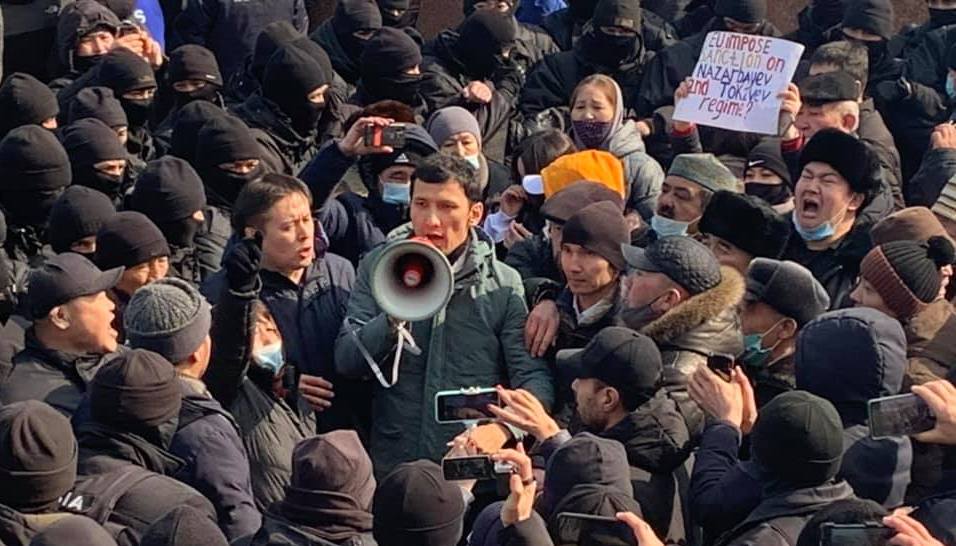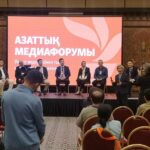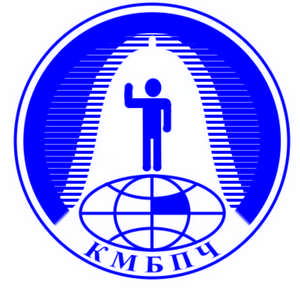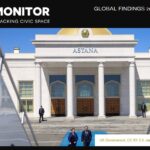A new briefing paper by International Partnership for Human Rights (IPHR) and Kazakhstan International Bureau for Human Rights and Rule of Law (KIBHR) highlights urgent concerns regarding civic space and fundamental freedoms in Kazakhstan. These include rising hostile rhetoric about alleged harmful foreign influence, and proposals for ‘’foreign agent’’ legislation and an ”LGBTI propaganda” ban—amid the Trump administration’s overhaul of US foreign assistance—along with a criticised new media law, crackdowns on peaceful protest, politically motivated prosecutions of government critics, and continued widespread impunity for January 2022 abuses.
Prepared as input for the EU’s Human Rights Dialogue with Kazakhstan in early March 2025, the paper draws on IPHR and KIBHR’s ongoing monitoring of civic space as part of the global CIVICUS Monitor initiative.
The briefing paper covers the following major issues and recommendations, which the two organisations urge the EU to address as a priority during the dialogue:
Attacks on foreign-funded NGOs
Recent alarming developments have heightened concerns that new restrictions on foreign-funded NGOs may follow, similar to those imposed in Russia and other countries in the region
As the Trump administration has moved to dismantle USAID, negative rhetoric about foreign-funded NGOs has resurfaced in Kazakhstan, with policy makers seizing the moment to propose new measures to oversee and control such groups. Citing the Trump administration’s actions on foreign assistance, a Member of Parliament proposed adopting a ‘’foreign agent’’ NGO law in the country, saying it is time to ‘’rewrite the rules of the game with foreign donors who disguise political interests as ‘media support,’ ‘human rights,’ and ‘increasing tolerance’’. Another Member of Parliament called for a review of foreign-funded projects and for legislation to restrict so-called “malicious” foreign-funded programmes, such as LGBTI rights initiatives, which he claimed promotes an “alien ideology”. Pro-Russian, anti-liberal commentators further amplified these attacks, seeking to discredit and intimidate NGOs receiving funding from foreign donors.
NGOs receiving foreign funding are already subjected to a discriminatory reporting scheme and they are publicly listed – clearly to stigmatise them. Kazakhstan has also agreed to regular information exchange with Russia on countering “foreign agents.”
Recommendations:
The Kazakhstani authorities should:
- Ensure that any oversight of NGOs fully corresponds to Kazakhstan’s international obligations, refrain from adopting a ‘’foreign agent’’ NGO law, and abolish the public list of foreign-funded entities and the discriminatory reporting scheme for such groups.
- Refrain from stigmatising rhetoric targeting NGOs, including LGBTI groups.
Criticised media law and proposed ‘’LGBTI propaganda” ban
Kazakhstan’s new media law, which took effect in August 2024, has raised significant concerns among media experts and human rights defenders despite some positive features such as a ban on censorship and quicker state responses to media inquiries. In particular, vague restrictions on media content, insufficient safeguards against arbitrary actions, and problematic new registration have been criticised. New accreditation rules are also highly problematic.
A public petition to ban so-called LGBTI propaganda in summer 2024 prompted a government-ordered study on the alleged influence of LGBTI materials on children, raising concerns that restrictive legislation might follow. In January 2025, a Member of Parliament urged the government to fully implement the demands of the earlier petition and to regulate social media on the issue. He argued that concerns over potential Western criticism of Kazakhstan’s human rights record over a ‘’LGBTI propaganda’’ ban were no longer valid in light of the Trump administration’s policies.
Recommendations:
The Kazakhstani authorities should:
- Revise the media law and accreditation rules to bring them in line with international standards and ensure they cannot be used to unduly obstruct the work of media and journalists.
- Refrain from elaborating legislation and taking other steps to curb ‘’LGBTI propaganda’’ in violation of Kazakhstan’s international human rights obligations.
Lack of accountability for January 2022 abuses
While some 40-50 security and law enforcement officials have been convicted for torture and other abuses committed during the ‘’Bloody’’ January 2022 events, the number remains low compared to the scale of violations. Proceedings have also often been marred by fair trial concerns, lenient penalties and inadequate compensation for victims.
For example, in January 2025, six police officers were convicted in a case, where about a 100 people were detained on the Almaty-Bishkek highway and brutally tortured in a detention centre in Almaty region during the January events. These officers all received three-year prison sentences – which is lenient given the scale and nature of the abuses they committed. In addition, only some victims’ request for compensation were granted.
Recommendations:
The Kazakhstani authorities should:
- Ensure that all allegations of torture related to the January events are impartially an effectively investigated and that those responsible are brought to justice in fair trials and given penalties that correspond to the severity of their crimes. Victims should be granted adequate compensation.
Crackdown on peaceful protests
Authorities selectively deny permission for peaceful protests, disperse unsanctioned assemblies, and penalise participants – prior to, during and after gatherings. Using these tactics, authorities have obstructed assemblies on issues such as justice for victims of the January 2022 events, women’s rights, and democratic reforms.
Ahead of the October 2024 referendum on government plans to build a nuclear power plant, local authorities across the country rejected requests for peaceful protests. More than a dozen activists were detained for allegedly violating assembly rules, while another group faced criminal charges, widely seen as retaliation for their opposition to the nuclear power plant (see more on their case below).
Even those holding individual pickets – a type of assembly not regulated by the law on assemblies – are penalised. This includes those who protested in support of blogger Temirlan Yensebek following his arrest in January 2025 (see more below on his case).
In January 2025, the Constitutional Court issued an important ruling, stating that authorities must not automatically deny permission for peaceful assemblies, e.g. on the grounds that other events are already planned at the proposed venues. Instead, they must suggest an alternative time or venue.
Recommendations:
The Kazakhstani authorities should:
- Comply with the Constitutional Court ruling and refrain from automatically denying the right to hold protests.
- Revise the law on assemblies to introduce a simple notification procedure, in line with recommendations received during the Universal Periodic Review (UPR) last month.
- Allow peaceful protests to take place without hindrance, and stop detaining and penalizing participants in peaceful assemblies, even if held without pre-approval.
Persecution of activists, journalists, and bloggers
Civil society activists, opposition supporters, human rights defenders, journalists, and bloggers critical of the authorities face ongoing harassment and intimidation, from online threats to arrest on politically motivated charges. They are often charged under vague Criminal Code provisions like those prohibiting the spread of “false” information, “incitement” to discord, or involvement in “extremism”, with trials marked by due process violations and lengthy sentences despite the lack of credible evidence. Human rights groups and international experts have repeatedly criticised these Criminal Code provisions, and at the UPR in January 2025, Kazakhstan was urged to repeal or revise them to ensure compliance with international human rights standards. Despite these calls, Minister of Culture and Information Aida Balayeva recently proposed further strengthening penalties for ‘’incitement’’ to discord.
Current key cases of concern include:
Marat Zhylanbaev continues to serve a seven-year prison sentence for alleged ‘’extremism’’ in retaliation for his peaceful opposition activities. His party, Alga Kazakhstan! has been denied registration more than 25 times since 2022.
Journalist-blogger-activist Duman Mukhamedkarim is similarly serving a seven-year sentence on unsubstantiated ‘’extremism’’ charges. Prior to the criminal case against him, he was repeatedly sentenced to short-term detention for peaceful protests.
Temirlan Yensebek – a satirical blogger – is facing charges of ‘’inciting’’ inter-ethnic hatred for sharing a controversial song (which features offensive lyrics about Russians), although he did not write it, it’s not banned in Kazakhstan, and many others have shared it as well.
Women’s rights activist Dinara Smailova is facing charges of disseminating ‘’false’’ information and other charges related to her efforts to assist victims of domestic and sexual violence. She lives in exile in Europe but has been declared internationally wanted. UN experts have spoken out in her support.
In September 2024, 12 activists opposing the construction of a nuclear power plant in Kazakhstan were charged with attempting to prepare mass riots. The case, widely seen a politically motivated, remains under investigation, with five activists held in pre-trial detention.
Opposition journalist Aidos Sadykov died in July 2024 from injuries sustained in a Kyiv assassination attempt. Ukrainian authorities identified two Kazakhstani suspects but Kazakhstani authorities have failed to hand them over (although one was detained in Kazakhstan). Sadykov had previously been declared internationally wanted for ‘’inciting’’ discord in Kazakhstan.
Recommendations:
The Kazakhstani authorities should:
- Stop arresting, prosecuting and convicting activists, journalists and bloggers in retaliation for their exercise of fundamental freedoms; clear those prosecuted on such grounds of charges and immediately and unconditionally release them.
- In accordance with UPR recommendations received, repeal or revise the Criminal Code provisions on ‘’inciting discord’’, ‘’knowingly spreading false information’’ and involvement in ‘’extremist’’ activities to align them with international standards. In the meantime, the authorities should refrain from imposing stiffer penalties for these broadly worded offenses.
These, as well as additional issues and cases are described in more detail in the full briefing paper, which can be downloaded HERE .

















